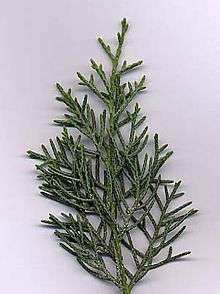Cupressus arizonica
| Cupressus arizonica | |
|---|---|
 | |
| Cupressus arizonica var. glabra (Smooth Arizona Cypress) foliage | |
| Scientific classification | |
| Kingdom: | Plantae |
| Division: | Pinophyta |
| Class: | Pinopsida |
| Order: | Pinales |
| Family: | Cupressaceae |
| Genus: | Cupressus |
| Species: | C. arizonica |
| Binomial name | |
| Cupressus arizonica Greene | |
 | |
| Natural range of Cupressus arizonica | |
| Synonyms[1] | |
|
Synonymy
| |
Cupressus arizonica, the Arizona cypress, is a North American species of trees in the cypress family. It is native to the southwestern United States (Arizona, Utah, southwestern New Mexico, and southern California, with a few populations in southern Nevada and in the Chisos Mountains of western Texas), and in Mexico (Coahuila, Chihuahua, Sonora, Durango, Tamaulipas, Zacatecas and northern Baja California).[2][3] In the wild, the species is often found in small, scattered populations, not necessarily in large forests. An example occurrence is within the Sierra Juárez and San Pedro Mártir pine-oak forests of Mexico,[4] where it is found along with Canyon Live Oak and California Fan Palm.
Description
Cupressus arizonica is a coniferous evergreen tree with a conic to ovoid-conic crown. It grows to heights of 10–25 m (32.8-82.0 ft), and its trunk diameter reaches 0.5 m (19.7 in). The foliage grows in dense sprays, varying from dull gray-green to bright glaucous blue-green. The leaves are scale-like, 2–5 mm long, and produced on rounded (not flattened) shoots. The seed cones are globose to oblong, 15–33 mm long, with 6 or 8 (rarely 4 or 10) scales, green at first, maturing gray or gray-brown about 20–24 months after pollination. The cones remain closed for many years, only opening after the parent tree is killed in a wildfire, thereby allowing the seeds to colonize the bare ground exposed by the fire. The male cones are 3–5 mm long, and release pollen in February–March.[3]
Taxonomy
Up to five varieties are distinguished by some botanists,[1] and these are sometimes treated as distinct species:
- Cupressus arizonica var. arizonica, Arizona Cypress - secure. Southern Arizona, southwest New Mexico, south to Durango and Tamaulipas, Chisos Mountains of west Texas.
- Cupressus arizonica var. glabra, Smooth Arizona Cypress - secure. Central Arizona.
- Cupressus arizonica var. montana (C. montana), San Pedro Martir Cypress - Vulnerable. Sierra Juárez and San Pedro Mártir pine-oak forests of Northern Baja California.
- Cupressus arizonica var. nevadensis (C. nevadensis), Piute Cypress - Least Concern. Southern California (Kern County and Tulare County).
- Cupressus arizonica var. stephensonii, Cuyamaca Cypress - Critically endangered. Southern California (San Diego County). Most of this population was burnt in the October 2003 Cedar Fire, though (as expected for a fire-climax species) subsequent regeneration has been good.
Uses
Arizona Cypress, particularly the strongly glaucous var. glabra, is widely cultivated as an ornamental tree. Unlike Monterey Cypress, it has proved highly resistant to cypress canker, caused by the fungus Seiridium cardinale, and growth is reliable where this disease is prevalent.
The cultivar 'Pyramidalis'[5] has gained the Royal Horticultural Society's Award of Garden Merit.
References
- 1 2 The Plant List, Cupressus arizonica Greene
- ↑ SEINet, Southwestern Biodiversity, Arizona chapter photos, description, distribution map
- 1 2 Flora of North America, Cupressus arizonica Greene, 1882. Arizona cypress, Arizona smooth cypress, Cuyamaca cypress, Piute cypress, cedro, cedro blanco, ciprés de Arizona
- ↑ National Geographic. 2001
- ↑ "RHS Plant Selector - Cupressus arizonica 'Blue Ice'". Retrieved 20 July 2013.
Further reading
- World Wildlife Fund (2001). "Sierra Juarez and Sierra Pedro Martir Pine-oak Forests". WildWorld Ecoregion Profile. National Geographic Society. Archived from the original on 2010-03-08.
| Wikimedia Commons has media related to Cupressus arizonica. |
- Conifer Specialist Group (1998). "Cupressus arizonica". IUCN Red List of Threatened Species. Version 2006. International Union for Conservation of Nature. Retrieved 12 May 2006.
External links
- Arizona Cypress Photos at Hike Arizona
